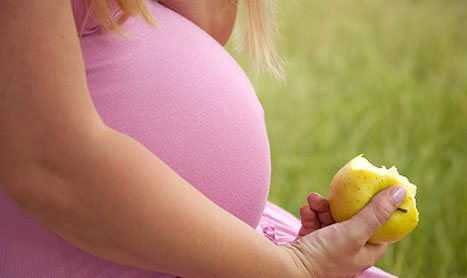 Making sure you’re eating healthy foods throughout your pregnancy is not just good for your own health, but also for your unborn baby’s health too. Contrary to popular belief though, eating for two doesn’t mean you should ditch your regular eating habits completely and reach for the pickles dipped in icecream and smeared with ketchup for every meal!
Making sure you’re eating healthy foods throughout your pregnancy is not just good for your own health, but also for your unborn baby’s health too. Contrary to popular belief though, eating for two doesn’t mean you should ditch your regular eating habits completely and reach for the pickles dipped in icecream and smeared with ketchup for every meal!
Read on for our top tips to help you maintain healthy eating during pregnancy.
How much more should I be eating while pregnant?
It’s not as much as you might think! If you are of an average weight, during your first trimester, you don’t actually need to be modifying your eating habits at all. During your second trimester, you should be eating around 300 additional calories (the equivalent of a sandwich with light fillings in it) each day, and by your third trimester this should be upped to around 450 calories (a more decent sandwich!).
Pregnancy isn’t the time to drastically overhaul your diet
If you need to lose or gain weight for health reasons during your preganancy, your doctor will let you know and advise the safest way to do so. Unless a medical professional recommends it, now isn’t the time to be dieting to shed pounds – or overeating for that matter either!
Some kind of weight gain and an increase in appetite is normal during pregnancy, so just make sure you maintain a healthy diet, eat a little extra in your second and third trimester, and stay active with pregnancy-safe exercise (unless otherwise advised by your doctor).
What your diet should look like during pregnancy
The Ministry of Health recommends that throughout your pregnancy, you should be eating a variety of healthy foods including:
– Vegetables and fruit
– Healthy carbohydrates such as breads and cereals (preferably wholegrain)
– Milk and milk products (ideally reduced-fat or low-fat milk)
– Lean meat, chicken, seafood, eggs, legumes, nuts and seeds.
Foods to avoid or limit during pregancy
The reason why certain foods should be avoided or limited during pregnancy is because your immunity is lower than usual which means that you may be affected by certain bacteria such as listeria. This is also down to the way food is prepared and cooked. Here are some of the key foods to avoid:
- Unpasteurised milk and dairy products
- Uncooked deli meats (such as salami, hams etc.)
- Cold/smoked meats (cold chicken, sushi, smoked salmon etc.)
- Soft cheeses (brie, feta, camembert, some may be okay if eaten piping hot)
- Foods containing raw eggs (mayonnaise, hollandaise sauce etc.)
- Cold/pre-prepared and unfridged salads
- Hummus and similar dips
- Foods high in mercury (certain fish – but not all! Usually the longer living/larger fish)
- Alcohol and energy drinks (and preferably caffeine as well)
- Soft serve ice cream
- Cream or custard (unless home-made or pre-packaged and eaten within 48 hours)
Also, try and limit your intake of foods high in salt, fat, and processed sugar. So… basically your average, healthy, well-balanced diet minus a few things! Make sure you drink plenty of fluids each day to stay well hydrated; your best options are water or low fat milk. Try to stay away from soft drinks and limit your intake of fruit juice to keep your sugar levels regulated.
Be careful with food preparation – wash your hands, utensils and chopping boards thoroughly between preparing raw and ready-to-eat foods to avoid cross-contamination, cook food thoroughly – especially meat – until juices run clear, don’t eat food past its use-by date, and avoid ready-to-eat prepared foods such as deli meats and buffet foods unless they are served piping hot (and the same goes for foods re-heated in the microwave).
For a full list, visit the Ministry of Health website and see ‘Food Safety in Pregnancy‘.
Supplements that may be good to take during pregnancy
Folic Acid helps to form new tissue and blood cells, and more Folic Acid than usual is required during pregnancy. Even though the risk is low, deficiencies in Folic Acid can result in neural tube birth defects such as spina bifida. To reduce the risk even further, the Ministry of Health recommends taking an 800 mcg Folic Acid supplement daily, preferably for one month before becoming pregnant right through to the twelfth week of your pregnancy. Folic Acid/folate can also be found in a number of foods such as green vegetables, chickpeas and citrus fruits, alternatively some foods such as breads and cereals are fortified with extra folate.
Iodine helps with growth and development, and your intake during pregnancy and breastfeeding should be increased by taking a pregnancy specific 150 mcg iodine-only tablet on a daily basis which is available from pharmacies or on prescription from your doctor.
With any supplements, make sure you talk it through with your doctor first and don’t take more than the recommended amount unless otherwise advised by a medical professional.
Image / FreeDigitalPhotos.net – Adamr

